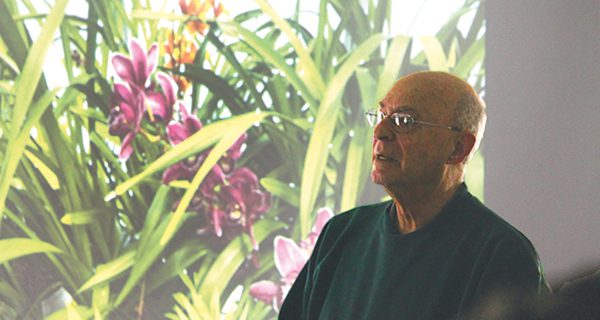[ccfic caption-text format="plaintext"]
By James Kinneen
Hometown Weekly Reporter
Don’t overwater your orchids.
If there was one thing that Dr. Paul Steen wanted to convey to the members of the Medfield Garden Club during his PowerPoint presentation last Wednesday morning at the United Church of Christ, it was this simple message he repeated multiple times.
Do not overwater your orchids.
But that won’t guarantee success.
Before he gave his presentation, Dr. Steen asked the crowd: “How many of you have killed at least one orchid?”
Nearly the entire room of seasoned gardeners raised their hands. Some audience members even did so with their other arm draped around a bucket or pot containing an orchid on which they were desperate for an expert opinion. “Mine doesn’t look like that,” one woman declared when Dr. Steen showed the light green color orchids should be.
When a raffle was held to win an orchid from a local vendor after his presentation, another woman in the audience declared to a nearby friend: “I don’t want to win it. It sounds like too much work.”
Yes, orchids are very difficult to grow. But if you wanted to challenge yourself to grow one, Dr. Steen was going to walk you through the process step by step.
Dr. Steen was in the navy before he became a physician, and it was while stationed in Guam that he first developed a passion for tropical plants, including the orchids which grew on many of Guam’s trees. In Guam, Dr. Steen noted that he “never saw a dry day.” And that “the only difference between the wet and dry seasons were how much rain you got. I asked when the dry season was, and they told me you’re in it.”
But while orchids thrive in places with a lot of rain, they also thrive in places with high heat and humidity.
Because of this, Dr. Steen suggests that you use the faucet to mimic a heavy downpour, soaking the roots which absorb water extremely quickly - but do not let the soil remain soaked, or you will strip it of oxygen. Remember, while there is heavy rain in tropical locales, the orchids need to absorb the water quickly before the tropical heat does.
Dr. Steen was also very clear that occasionally, orchids would need to be repotted. While describing the various calls he gets on the Master Gardeners of Massachusetts hotline, he said that when discussing orchids, he always asks the gardener when the last time they repotted the plant was and is often met with “a pronounced silence.”
When his presentation was finished, Dr. Steen took a few questions from the crowd, including with a woman who couldn’t figure out what was wrong with her orchid. After a brief back-and-forth, the audience was able to experience a brief moment of that pronounced silence, when the woman hesitated before admitting: “I’ve never re-potted it.”
Another question was about the use of ice cubes rather than watering the orchids. Interestingly, Dr. Steen explained that the ice cube method was invented solely to keep people from overwatering the orchids, mainly due to sellers offering one-year guarantees on the orchids they sell. While the ice cube technique will likely kill the orchid in fifteen months, the flower will survive past the warranty date.
Dr. Steen also laid out the six easiest orchids to grow and suggested buying an orchid that had not fully flowered, because it’s impossible to know how long the orchid’s flower has bloomed.
But above all else, Dr. Steen wanted to make it abundantly clear not to overwater the orchid. So much so that after the fifth or sixth time he said it, he looked to the crowd and smirked before adding, “I hope I’ve gotten that across.”










